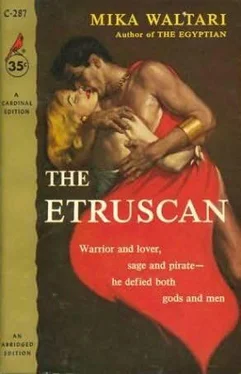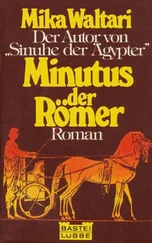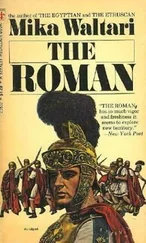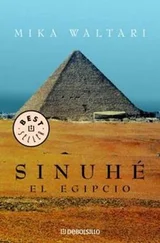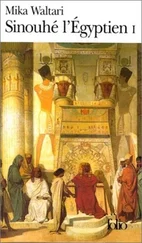Mika Waltari - The Etruscan
Здесь есть возможность читать онлайн «Mika Waltari - The Etruscan» весь текст электронной книги совершенно бесплатно (целиком полную версию без сокращений). В некоторых случаях можно слушать аудио, скачать через торрент в формате fb2 и присутствует краткое содержание. Жанр: Исторические приключения, на английском языке. Описание произведения, (предисловие) а так же отзывы посетителей доступны на портале библиотеки ЛибКат.
- Название:The Etruscan
- Автор:
- Жанр:
- Год:неизвестен
- ISBN:нет данных
- Рейтинг книги:4 / 5. Голосов: 1
-
Избранное:Добавить в избранное
- Отзывы:
-
Ваша оценка:
- 80
- 1
- 2
- 3
- 4
- 5
The Etruscan: краткое содержание, описание и аннотация
Предлагаем к чтению аннотацию, описание, краткое содержание или предисловие (зависит от того, что написал сам автор книги «The Etruscan»). Если вы не нашли необходимую информацию о книге — напишите в комментариях, мы постараемся отыскать её.
The Etruscan — читать онлайн бесплатно полную книгу (весь текст) целиком
Ниже представлен текст книги, разбитый по страницам. Система сохранения места последней прочитанной страницы, позволяет с удобством читать онлайн бесплатно книгу «The Etruscan», без необходимости каждый раз заново искать на чём Вы остановились. Поставьте закладку, и сможете в любой момент перейти на страницу, на которой закончили чтение.
Интервал:
Закладка:
He did not smash the deity’s figure but made it an offering. “Side with me, Phoenician god, whatever your name may be, and fight for us.” He made no changes on the ship other than painting large eyes on its prow so that it would find its way even on distant seas.
By nightfall the sea around us was deserted. Dionysius made no attempt to land but had the vessels proceed within calling distance of one another, with the rowers alternating at the oars. The moans of the wounded echoed through the ship and Dionysius’ only remedy was to wash the wounds with sea water and cover them with tar. Dorieus had acquired numerous bruises. He also had been struck on the head by an oar with such force that his scalp had split before he had succeeded in removing his helmet.
Seeing the misery around me in the dark of night and the frightening emptiness of the sea, I was ashamed of my own invulnerability and wept aloud, something I had not done since Herakleitos had banished me from his house, calling me ungrateful. I had danced the dance of freedom and helped the people to banish Hermadoros from Ephesus, and Herakleitos had been unable to forgive me.
4.
When I awakened the sun was high, the water was murmuring under the prow, the oarsmen were singing in time with the bronze beat, and to my surprise I saw from the sun that we were going southward instead of northward to Phocaea.
Dorieus was seated at the prow, holding a wet cloth to his head. I asked him, in the name of all the sea gods, where we were going, for there were brown hills to the left of us and shadowy blue islands to the right.
“I don’t know,” said Dorieus, “and I don’t care. There’s a swarm of bees in my head and the very sight of the sea makes me ill.”
The wind had picked up and the waves were beating at our sides, occasionally splashing in through the oar ports. Dionysius was cheerfully arguing with the helmsman about shadows and landmarks.
“Where are we bound?” I demanded. “You are taking us into Persian waters.”
Dionysius laughed. “The Ionian ships are fleeing northward to their respective cities, but we are behind the Persian fleet and no one would think of looking for us here.”
A dolphin leaped into the air, baring its glistening loins. Dionysius pointed to it. “Can’t you see that the sea nymphs are tempting us with their rounded hips? Any sign that takes us farther from the Persians and lost lonia is a favorable one.” I could see from the glint in his eyes that he was jesting and that he had already made his decision.
He indicated a large blue island before us, signaled to the helmsman, and said, “That is Cos, island of the healers. Stop talking and go below to see how many of us need a coin in our mouths to pay the ferry.”
Leaving behind the leaping dolphin, the glorious sea breeze and the chant of the rowers, I descended to the bottom of the vessel where the wounded lay on the blood-slippery planks. A feeble light shone through the oar ports and the moaning had ceased.
“A few are dead,” I told Dionysius, “others cannot lift a hand, and still others are trying to sit up and are calling for food and water.”
“Throw the dead to Poseidon and his nymphs,” said Dionysius. “I shall take with me only those who are able to reach the deck either on foot or on their bellies. The others we shall leave at the temple of the healer on Cos.”
He shouted the same instructions to the two vessels following us. The men of Phocaea unclothed the dead, thrust a coin into the throat of each and tossed them into the sea. Most of the wounded managed to drag themselves on deck, cursing and groaning and calling upon the gods to aid them, for no one wanted to be left behind.
Not all the men reached the deck. Under the strain some of their wounds reopened, their blood bubbled forth onto the planks, their hold slackened and they fell back into the darkness.
Seeing this, I said harshly, “You are merciless, Dionysius.”
He shook his head. “On the contrary, I am merciful. Who are you to talk, Turms? These wounded are my people. I have risen to be their leader, I have shared my bread and salt with them and have thrashed seamanship into them with my rope. But a man gets by in life only with his own strength. The immortals will not drag me by the hair onto the deck if I lie helpless in the dark of the ship. I am the one who must make the effort even if it means dragging myself onto the deck by my teeth. I demand no more of them than I do of myself.”
Still he did not consent to say what his plans were. With the temple of Aesculapius as landmark, we rowed into the harbor of Cos. Only fishing and diving boats remained, for the Persians had seized all the larger vessels. They had not, however, destroyed the city.
Priests and physicians came to meet us at the shore and Dionysius had the badly wounded men carried off the ships. Many were unconscious, others delirious, and the priests consented to give these asylum in the temple so that they might fall into a healing slumber.
“We are not afraid of the Persians,” said the priests. “A healer is not concerned with the nationality or language of the sick, or with their beard or the cut of their clothes. The Persians likewise left their wounded at the temple.”
Dionysius laughed. “I respect the temple and fortunately my men are either delirious or unconscious. Otherwise they would crawl over the temple floor and with their bare hands throttle the Persians lying beside them. But even if a healer is not concerned with the language of the sick, I have always thought that he looks carefully at their purse.”
The priests met his eyes frankly. “Many who have returned from the threshold of death have dedicated votive offerings to the temple. But the clay bowl of the poor is as cherished as the silver figure or the tripod sent by the wealthy. We do not heal for money but to develop the divine skill which Aesculapius has given us, his heirs. This we swear in the name of the eye, the hand and the nose, the flame, the needle and the knife.”
The residents of the city hastily prepared a feast for us, but diluted the wine with five parts of water, for they had had experience with drunken sailors in the past. The day ended, the mountain peaks flamed, and splashes of purple swam in the sea, but still Dionysius delayed our departure. The priests began to glower and hint that it had not been their intention to provide asylum for warships but only for the wounded.
“I understand,” said Dionysius. “lonia’s freedom has ended on sea and land and from now on you must welcome the Persians in preference to your own people. I shall leave as soon as I receive a favorable omen.”
As dusk settled over the island and the fragrance of spices rose from the temple gardens, Dionysius drew me aside.
“Advise me, Turms, you who are an educated man, for I am in worse than a fix. I wouldn’t for anything insult these elders and their god, but we are about to leave for dangerous waters and I can’t afford to lose a single sailor. That’s why I intend to carry off one of Aesculapius’ heirs. He must not be too old, otherwise he won’t be able to withstand the rigors of the sea, and he must be able to heal wounds, fevers and stomach complaints. In addition, it would be good if he also spoke Phoenician, as many of the priests do.”
“What are you planning to do?” I asked.
He glanced at me guiltily and finally confessed. “Don’t you understand, Turms? The Persians have enlisted in their service all the warships of Cyprus and Phoenicia as far as Egypt, leaving the sea open and defenseless as a cow’s belly. Kairos help me, I intend to serve the god of the opportune moment.”
“In the name of the immortals!” I cried in dismay. “Honest warfare for freedom is one thing, piracy on the open seas another. The life of a pirate is short, his death fearful, and his name forever disgraced. He is hunted from one end of the sea to the other, he can find no refuge, and his very name strikes terror into respectable people.”
Читать дальшеИнтервал:
Закладка:
Похожие книги на «The Etruscan»
Представляем Вашему вниманию похожие книги на «The Etruscan» списком для выбора. Мы отобрали схожую по названию и смыслу литературу в надежде предоставить читателям больше вариантов отыскать новые, интересные, ещё непрочитанные произведения.
Обсуждение, отзывы о книге «The Etruscan» и просто собственные мнения читателей. Оставьте ваши комментарии, напишите, что Вы думаете о произведении, его смысле или главных героях. Укажите что конкретно понравилось, а что нет, и почему Вы так считаете.
